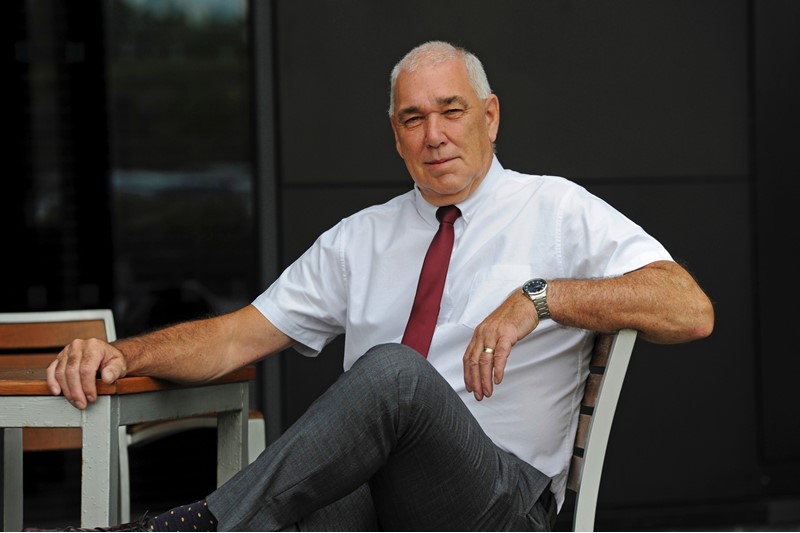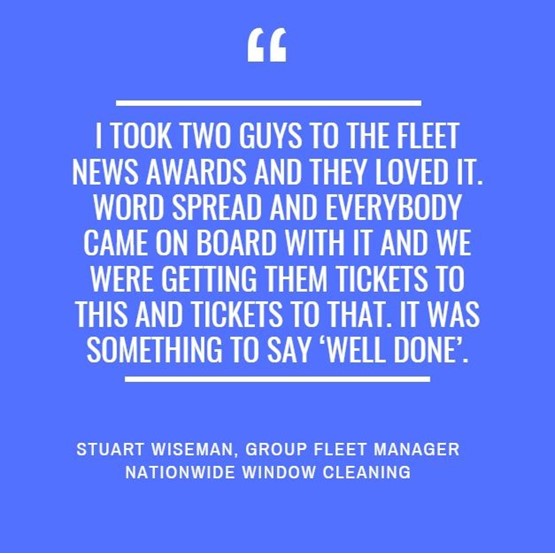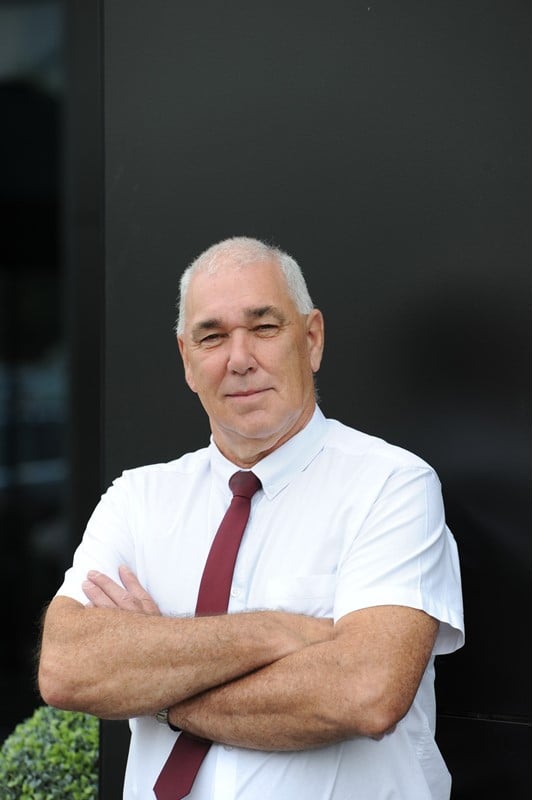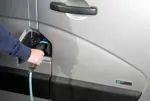Senior management buy-in has been essential to Nationwide Window Cleaning’s risk management programme, which has reduced accidents by 23%, says fleet boss Stuart Wiseman. Sarah Tooze reports
Nationwide Window Cleaning (NWC) has reduced its accident rate by 23% for the first six months of the year compared with 2017 thanks to a combination of vehicle technology, communication and, ultimately, cultural change.
The impressive results come on the back of further savings the year before which led to NWC being named most improved fleet at the 2017 Commercial Fleet Awards.
Key to success was fitting the entire fleet of 257 vans with telematics and speed limiters (set at 62mph to help deliver fuel savings as well as safety benefits).

NWC group fleet manager Stuart Wiseman says: “Telematics was something I felt we required because we needed to get a handle on the fleet itself. What was it doing? Where was it? How was it working?”
Wiseman joined the company two years ago when business growth meant NWC needed an experienced fleet manager. He has been in fleet for 30 years and his CV includes managing vehicles for large distribution companies, housing associations and local authorities.
Latterly, he worked for Yorkshire Housing but says he got “comfortable” and wanted to take on a bigger fleet with more responsibility so he moved to Andrew Page in 2014 and then to NWC in 2016.
“I enjoy something that is going to challenge me as an individual, something I can get my teeth into and see through. I don’t like to get comfortable,” Wiseman says.
Since his appointment, NWC’s fleet has trebled from less than 100 vehicles to 290 (29 cars, 257 vans and four HGVs) through a combination of business mergers and contract wins.
The cars are used by area managers, regional directors and the senior management team, with an average annual mileage of 25,000. The vans are used for three types of operation:
- the retail sector – window cleaning for banks, chemists etc.
- commercial work – such as supermarkets and large buildings in the centre of London and Birmingham, and airports
- technical work – graffiti removal, gutter cleaning and work at fuel stations, etc.
In performing these tasks, they clock up 17,000-20,000 miles a year.
NWC has recently merged with High Access, which specialises in high-level window cleaning and has a fleet of 150 vehicles. However, there are no plans for those vehicles to fall under Wiseman’s remit.
“We’re going to keep the two (fleets) separate,” he says. “High Access has a fleet manager who operates from a different depot. All the vehicles come back to base and it’s easier for him to manage. All mine are based at home addresses, spread throughout the UK.
"But we’ll work together and look at the systems he’s got and I’ve got that could benefit both.”

High Access’s vehicles are all contract hired and Wiseman is considering moving all of NWC’s vehicles to the same funding method.
“We have a mixture of contract hire, lease purchase, hire purchase and outright purchase – as we’ve grown different things have come into play,” Wiseman says. “What we’re possibly looking at is the potential for a full contract hire fleet.”
The car fleet is already leased on a three-year replacement cycle. The cars (bar one) have been replaced over the past year with a switch from diesel to hybrid, lowering the fleet’s carbon footprint.
“The company is serious about its footprint,” Wiseman says. “When we’re tendering for work, all the clients want to know ‘what is your carbon footprint? What are you doing to lower it?’”
Wiseman has looked at electric vans but the range isn’t sufficient and the drivers would need to spend too long charging the vehicles between jobs.
He is proposing that all of the vans move from a four-year replacement cycle to three years. How much that could save is difficult to measure because of the varying funding methods.
“We’d be giving all that risk possibly to someone else, i.e. the contract hire company, which helps our budgeting and because of the synergy with the merged company, there are some benefits to be had there,” Wiseman says.
He also knows from experience that using an external provider could save time.
When he first took on the NWC fleet he appointed Incident Support Group (ISG) to help gather data.
“They started building all the information for me to work off,” he says.
At “almost the same time” he introduced Masternaut’s telematics system.

“I wanted something that was easy to use, one platform, and I’ve got that with them and I can manipulate all the information however I want,” Wiseman says.
Getting the senior management team to buy-in to telematics was a case of showing them how much incidents were costing the company – not just the bent metal cost, but all of the associated ‘hidden’ costs.
The chief executive sent a letter informing drivers that telematics was being introduced and what was expected of them.
Since introducing telematics, Wiseman has brought in a league table system in the past seven months.
“We do it by region so say a region has 20 drivers they have a league, then we have a company one for the whole fleet so there is competition right across the board,” Wiseman says.
“We separated the league table for speeding and that’s had a massive improvement. The benefit of that is fuel economy.”
Drivers are able to monitor their own performance through an app on their phone, and “more and more drivers are taking it up”, Wiseman says.
He adds: “The most important thing about this is it’s been driven from the top. I give the managing director a list of the 10 worst drivers and she will write to them personally. So buy-in is right from the top. It goes straight to the end-user and then we follow it on from there.”
Telematics has proved “invaluable” in a number of areas, according to Wiseman. It has exonerated drivers for speeding and complaints from members of the public and helped NWC recover five stolen vehicles.
“It has got a lot of benefits that people can see,” he says. “It’s about protecting them, it’s duty of care. We can see what’s going on, they weren’t speeding, they weren’t in that area so it’s beneficial for more than just driver behaviour.
"That’s something I’ve had to get across to the drivers. It’s not a spy in the cab, we’re not trying to catch you out.
“It’s our vehicle, we want it to be looked after and driven correctly. Also, when you leave home in the morning, I want you to go home that night. That’s what it’s about.”
However, he adds that telematics will only save a company money “if you use it correctly”.
“You can’t install it and hope it’s going to magically sort everything,” he says.
Wiseman has telematics fitted to his own company car.

“It demonstrates to them (the drivers) how seriously I take it and the benefit is my driving style has changed. I’m more relaxed. I’ll drive down the inside lane and watch all the other people that are in hurry speeding down the outside lane,” he says.
Wiseman believes that other drivers can be the cause of stress behind the wheel and he favours in-vehicle assessments rather than online risk assessments so he can judge how his drivers cope “in real life”.
In-vehicle assessments proved successful at Yorkshire Housing and at Andrew Page so Wiseman was keen to introduce them at NWC.
Currently, Wiseman and three area managers are trained assessors. He would like all 16 area managers to become assessors but it “won’t happen overnight” as it requires a week’s training with RoSPA.
All new employees undergo an assessment because “they might have been driving a car for years but now we’re going to put them in an LCV with a load in the back. It’s different, it doesn’t stop as quick, it doesn’t handle as quick”, Wiseman says.
He also assesses drivers after an incident as part of the investigation.
“If I’m going to assess somebody I want them in a vehicle that they’re going to drive on a daily basis with a load of water or whatever in the back and see how they handle that in real life situations,” he says.
“I do a lot in London. As you can imagine that’s not the best place to do any assessment but you get to see how people handle pressure situations because it is pressure driving, it’s very stressful and you’ve got to see how they handle that stress.
“When they do it (an assessment) online they’re sat at home. There is no stress. When you get them in the van you can talk them through it. I say to them ‘the first thing you’ve got to do is relax, take your time, you’ll get there just as quick’ and it takes the stress away.
“Once they learn how to deal with that then driving can actually become a pleasure but it’s taking away that stress, not trying to race other drivers.”
He adds that it is “pressure from other drivers that causes the issues” as his drivers were frequently being tailgated and NWC had to put stickers on the vans to show they were fitted with speed limiters.
Driving assessments also enable Wiseman to set a benchmark performance for each driver.
He has, on occasion, given vouchers for exceptional driving and NWC is considering a rewards system that would pay for itself through the savings made from better driving.
A rewards system worked well when Wiseman was at Yorkshire Housing.
“I took two guys to the Fleet News Awards and they loved it. Word spread and everybody came on board with it and we were getting them tickets to this and tickets to that. It was something to say ‘well done’.”
However, at NWC the stick is used as well as the carrot. A penalty for an at-fault incident of up to £500 was introduced in February (previously it was £250). This penalty figure is deducted in weekly amounts.
Wiseman expected a backlash when it was introduced but “we never had one” as drivers understood why it was necessary and that incidents would be investigated thoroughly.
Wiseman looks at the vehicle data, the driver’s history, the service history of the vehicle and interviews the driver if necessary before a penalty is imposed.
Getting NWC’s insurers and road traffic police officers to talk to the drivers has also had an impact.
“The insurers did a talk on how insurance works, the impact of an accident, who it impacts.
"You might have run into the back of somebody, you’ve got the injuries they will claim, the downtime, all the credit hire, all these costs. What might have been a broken bumper at the back is suddenly going to cost you £30,000.”
Wiseman said it came as a shock to the drivers. “They didn’t realise,” he says. “I think the attitude used to be ‘well, we’re insured’ so there has been a culture change going on in the company.”
So far police have given one talk to NWC’s south-west team but Wiseman is in touch with various road traffic teams to arrange talks for other areas.
The talk covered speeding and the impact of speeding and what the police officer has to do, including going to see bereaved parents.
“The drivers thought it was good to hear a different perspective on it, that touch of reality,” Wiseman says.
“I can stand in front of people and tell them until I’m blue in the face but there comes a point when it starts going over their heads, they get fed up of it so they need to hear it sometimes from a different voice, a different manner, a different uniform. That helps get the message across.”
Wiseman likes to remind employees that they are professional drivers. “I go to meetings and I say ‘what’s your job?’ They say ‘window cleaner’. ‘How much time a day do you spend cleaning windows and how much time do you spend driving, I ask? ‘I probably spend more time driving’ is the common reply.
“What you’ve got to recognise is you are, without doubt, a professional driver. You drive for a living because without your vehicle, without driving, you can’t do your job’. But, likewise, we’ve got to treat them like professional drivers,” he says.

Changing fuel card providers saves £21,000
Nationwide Window Cleaning has saved £21,000 in six months after changing from a pump price fuel card to a fixed price card for its van fleet.
“We did a tender process and we came up with Key Fuels with BWOC,” says Stuart Wiseman. “There have been some savings although the cost of fuel has gone up recently.”
Wiseman has found that the network is sufficient and drivers can use a smartphone app to locate their nearest station.
He also values the reports, which enable him to track how much fuel has been drawn and where to pick up anomalies.
“It gives us a bit more control of the fleet usage,” he says.
“We get a weekly price, every Friday, and I keep a record of how fuel prices are going and I can forecast.”
















Login to comment
Comments
No comments have been made yet.